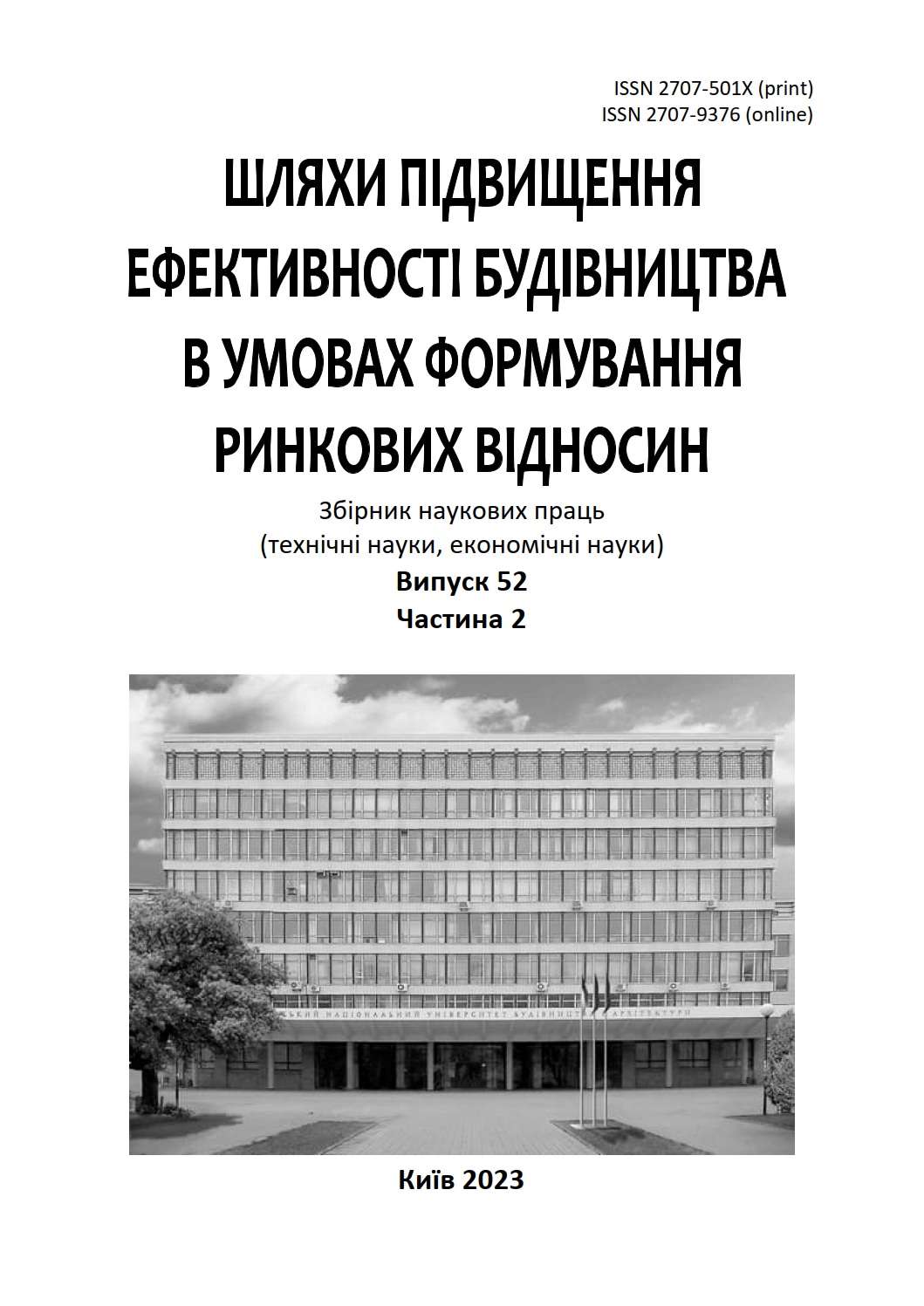Conceptual principles and theoretical basis of innovative activity in the modern construction industry
DOI:
https://doi.org/10.32347/2707-501x.2023.52(2).269-285Keywords:
innovation, innovative activity, attributes of innovation, construction industry, design, ecology, digitalization, management, sustainable constructionAbstract
The construction industry is one of the key sectors of the economy, which largely determines the level of development of infrastructure, the social sphere and the industrial potential of the state. In the context of globalization, rapid technological progress and growing environmental challenges, the relevance of innovative activity in the construction sector is constantly growing. The introduction of new technologies, materials, methods of design and management of construction processes is an integral part of the sustainable development of the industry, which allows to improve the quality, safety, efficiency and environmental friendliness of construction.
The conceptual principles of innovative activity cover comprehensive approaches to the creation, implementation and use of new technologies and materials that contribute to the optimization of construction processes. An important task is to harmonize scientific and technological progress with economic and environmental aspects. The introduction of modern digital technologies, such as BIM (Building Information Modeling), automation of construction processes, the use of artificial intelligence and "smart" construction solutions, significantly changes traditional approaches to the design, construction and operation of facilities.
The theoretical foundations of innovation in the construction industry are based on an interdisciplinary approach that combines engineering, economic, managerial and environmental aspects. Analysis of innovation processes allows us to identify key success factors, including financial support, research and development, legal regulation, international experience and professional training. Improving the regulatory framework and stimulating investment in scientific and technical development are important conditions for the formation of a favorable environment for innovation in construction.
Thus, the study of the conceptual foundations and theoretical foundations of innovation in the modern construction industry is of strategic importance. The introduction of innovations not only increases the competitiveness of the construction industry, but also contributes to the development of sustainable construction, which meets global trends and requirements of modern society.
References
Azarova, A. O., Bershov, D. M. (2004). Assessment of the effectiveness of investment projects. Finance of Ukraine. No. 9. P. 52–58.
Akoff, R. (2002). Planning the future of the corporation. 256p.
Bazhal, Y.M. (1996). Economic theory of technological change: Textbook K.: Prosvita.
Benashvili, V.M. (2020). Innovative processes in construction: Theoretical foundations and practical aspects. K.: Builder. 248 p.
Wiener-Gasometer [Electronic Resource]. Mode of access: http://www.wiener-gasometer.at – Title from the screen
Kuznetsova, A., Zinko, N.Ya., Drugov, O.O. (2009). Improving banking and non-banking financing of innovation activities in Ukraine. K.: UBS NBU. 175 p.
Kolinko, N.O. (2011). Management of innovation activity as the basis of qualitative changes. Bulletin of the National University "Lviv Polytechnic", 12,. 43.
Kuznetsov, A.O. (2018). Development of innovation activity in the construction sector: Conceptual approaches and directions. Kh.: KhNUMG. 304 p.
Denysenko, M.P., Ryzhenko, Ya.V. (2007). Strategic mission of innovation activity and ways of its activation in Ukraine. Problems of Science. No. 6. P. 10-16.
Gordienko, S.G. (2014). Innovative activity: problems, essence, substantive components and directions of improvement. Journal of the Academy of Advocacy of Ukraine. Vol. 7. No. 2. P. 15–32
Matvienko, P.V. (2006). Assessment of investment attractiveness of regions. Economy and State. No. 12. P. 66–71
Tsilyuryk, G.I. Innovative activity in the conditions of economic competition. Electronic resource. Access mode: https://salo.li/8040901
Udalikh, O.O. (2006). Management of investment activities of the enterprise: Textbook. Kyiv: Literary Educational Center. 292 p.
Norkina T.P., Skarbun Z.O. (2013). Improving the management of innovative development of construction industry enterprises. Economics of construction and urban economy. vol. 9, No. 1. Рp. 55-62
Chukhrai, N., Patora, R. (2006). Product innovation policy: management of innovations at the enterprise: textbook. Kyiv: Condor. 398 p.
Park Lake City [Electronic resource] // Official website. 2020. – Resource access mode: https://salo.li/1EDA1Ea .
Baranovsky, O. I. (2003). Directions for optimizing state regulation of the defense-industrial complex. Current problems of economy, 8 (26), 26-31.
Ryzhakova, G.M., Chupryna, Yu.A. (2019). Formation of a construction cluster in the format of state investment target programs. Ways of increasing the efficiency of construction. Issue 40. Рp. 19-24.
Chupryna, Y.A., Chupryna, Kh.M., Borodavko, M.V., Gavrikov, D.O. (2020). Strategies for reconfiguring business processes of construction enterprises. Management of complex systems development, 41, 169 – 174.
Tugai, O.A. (2019). Organizational and technological, economic quality control aspects in the construction industry: collective monograph. Lviv-Toruń: Liha-Pres. 136 p.
Downloads
Published
How to Cite
Issue
Section
License

This work is licensed under a Creative Commons Attribution 4.0 International License.
Authors who publish with this journal agree to the following terms:
- Authors retain copyright and grant the journal right of first publication with the work simultaneously licensed under a Creative Commons Attribution License that allows others to share the work with an acknowledgement of the work's authorship and initial publication in this journal.
- Authors are able to enter into separate, additional contractual arrangements for the non-exclusive distribution of the journal's published version of the work (e.g., post it to an institutional repository or publish it in a book), with an acknowledgement of its initial publication in this journal.
- Authors are permitted and encouraged to post their work online (e.g., in institutional repositories or on their website) prior to and during the submission process, as it can lead to productive exchanges, as well as earlier and greater citation of published work (See The Effect of Open Access).

